If you give someone cash or property valued at more than the 2025 gift tax exclusion limit of $19,000 ($38,000 for married joint filers), you’ll have to fill out Form 709 for gift tax purposes. But don’t fret. This doesn’t always mean you’ll owe an actual tax. The government requires this to keep track of your lifetime gift and estate tax exemption. It’s only when you use up the large lifetime exemption that you would owe an out-of-pocket tax. Still, filling out Form 709 can get complicated. This article will walk you through the process step-by-step. It’ll also help you determine if you need to fill out Form 709 in the first place.
If you’re looking help with specific areas of your finances, including tax planning, consider speaking with a financial advisor.
What Counts Toward the Gift Tax?
The IRS defines a gift as virtually anything of value that you give to another individual or entity without expecting anything of equal or lesser value in return. It doesn’t have to be cold, hard cash, either. This covers several types of asset and property. That includes a house, car, jewelry and more. It also includes several types of financial accounts such as an investment portfolio.
The following may also be considered gifts:
- A hefty loan you gave someone with zero interest
- Forgiving large debt that’s owed to you
- Gifting money out of retirement accounts
Nonetheless, the government does give you some wiggle room. Giving money to the following individuals or institutions is never considered a taxable gift:
- Spouse who’s a U.S. citizen (if spouse is not a citizen, there is a $190,000 limit)
- Care provider to cover someone else’s qualified medical expenses
- Educational institution to cover tuition only
- Political organizations
So you can give as much as you want to those individuals and institutions for the year without needing to fill out Form 709 or pay a gift tax.
But even if you think you’ve given away a lot in taxable gifts, you may not need to fill out Form 709 or pay a tax. That’s because of the gift tax limits.
What Is the Annual Gift Tax Exclusion?

For tax year 2026, you may give someone cash or property valued at up to $19,000 without needing to fill out Form 709. The exclusion applies per person. So you can give your son, daughter and grandchild $19,000 each without catching Uncle Sam’s attention. For married couples making joint gifts to a third party, the annual exclusion for the 2026 tax year is $38,000.
But once you transfer a taxable gift valued above those limits to any one person, you have to fill out Form 709. Officially, it’s called the United States Gift (and Generation-Skipping Transfer) Tax Return.
If you make a joint gift with your spouse, each individual must fill out a Form 709. There is no joint Form 709.
However, you won’t need to pay an actual tax unless you go beyond your lifetime gift and estate tax exemption. The Trump tax plan, known as the Tax Cuts and Jobs Act (TCJA), raised those limits considerably in 2018. Currently, the lifetime exemption is $15 million per individual for tax year 2026 (up from $13.99 million in 2025).
How to Fill Out Form 709
If you’ve figured out you must fill out Form 709, follow the instructions below.
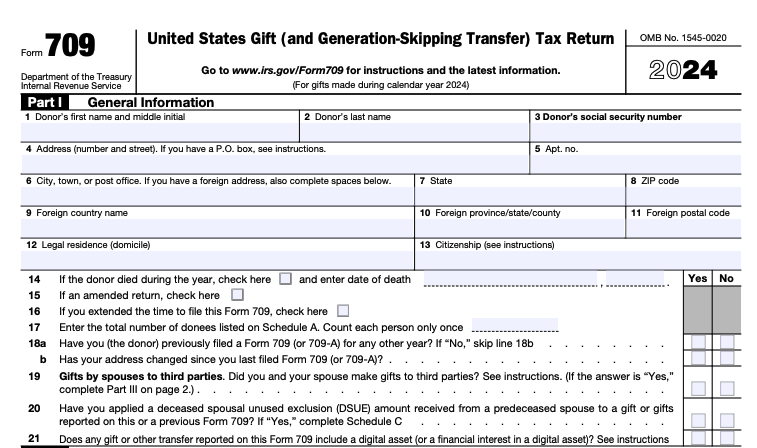
First, complete the General Information section on part one of the form. Line 12 would also allow you to check off on whether you and your spouse made joint gifts for the tax year. If not, you may skip lines 13 through 18. Note that your spouse must also sign Form 709 in the appropriate spot if you made joint gifts. But each would have to fill out his or her own form.
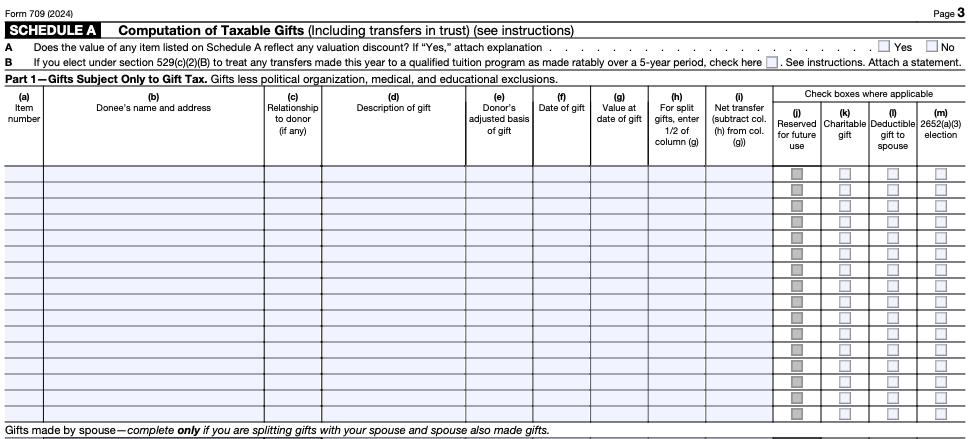
Report the gifts on Schedule A: Computation of Taxable Gifts. Here, you’d provide information such as a description of the gift, the recipient, and its value at the time it was made.
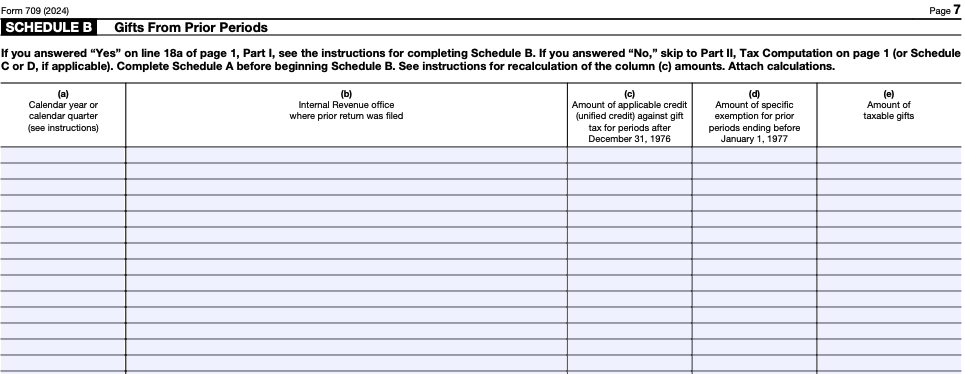
You may also report transfers subject to the gift tax and/or generation-skipping transfer tax if applicable. In addition, you’d report transfers made to trusts if any.
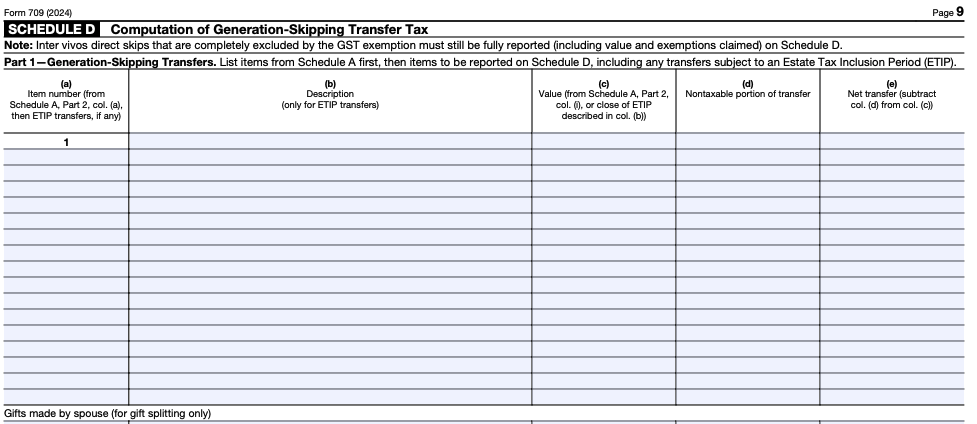
If any applies to you, complete the sections titled Gifts From Prior Periods, Deceased Spousal Unused Exclusion Amount and Computation of Generation Skipping Transfer Tax. These are Schedule B, C, and D, respectively.
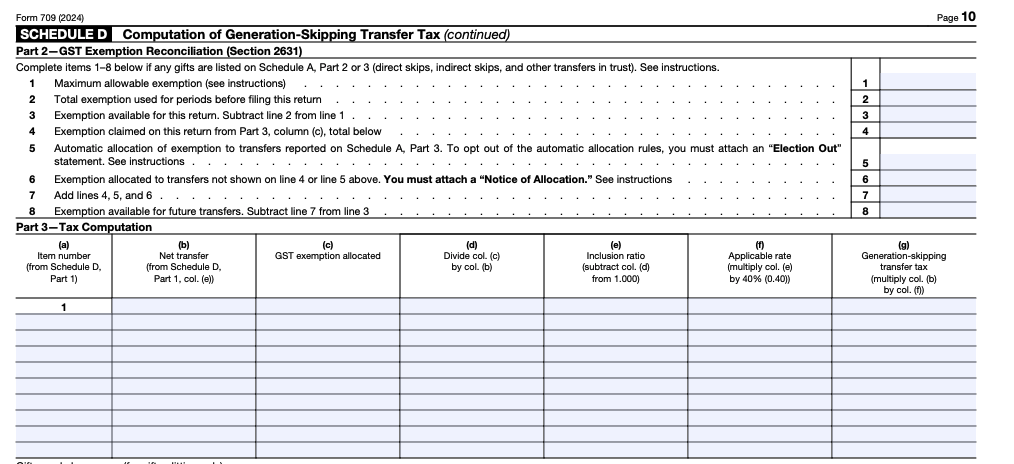
Complete Part 3, known as “Tax Computation.” It is located on the first page of Form 709. Refer to the “Table for Computing Gift Tax” under instructions to calculate the tax on the amount of reported gift or gifts. You may apply your lifetime gift and estate tax exemption, also known as the unified credit. So you don’t have to pay an out-of-pocket tax if you use this exemption. It will, however, reduce how much you can give and transfer out of your estate tax-free in the future.
Finally, sign and date the form.
Bottom Line
Unless you made a taxable gift valued at more than $19,000 to an individual or entity in 2026 or in 2025, you don’t need to fill out Form 709. If you did, you may just need to report the gift. You won’t owe an out-of-pocket tax until you’ve given more than your lifetime gift and estate tax exemption. That currently stands at $15 million for tax year 2026 and $13.99 million for tax year 2025.
Additional Tax Filing Tips

- Some financial advisors can help you optimize your tax strategy for your financial goals. Finding a financial advisor doesn’t have to be hard. SmartAsset’s free tool matches you with vetted financial advisors who serve your area, and you can have a free introductory call with your advisor matches to decide which one you feel is right for you. If you’re ready to find an advisor who can help you achieve your financial goals, get started now.
- If you’re investing in a 529 college savings plan, you have some special gift tax exemptions. We cover these in our study on how to give money to students and avoid gift tax.
- If you don’t feel like filing taxes by hand, you can always use tax software to get it done and avoid mistakes.
Photo credit: ©iStock.com/Andrei Barmashov, ©iStock.com/Andrii Yalanskyi, ©iStock.com/LIgorko
